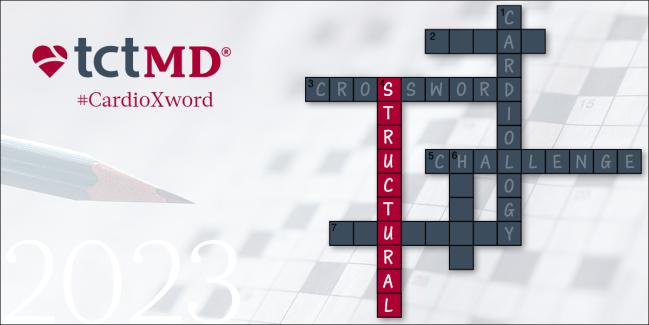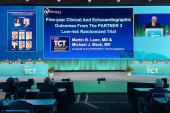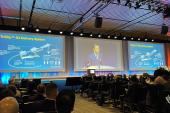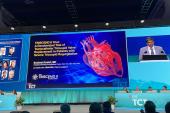Top Structural Heart News of 2023
Longer-term data from the low-risk TAVI trials and studies of tricuspid and mitral interventions led the way this year.

Over the past year, interventions for aortic, mitral, and tricuspid valve disease have dominated headlines in structural heart disease news.
Some of the most impactful studies were those providing longer-term comparative data of TAVI versus surgical aortic valve replacement (AVR; 3 Down*) in patients with symptomatic severe aortic stenosis.
TCT 2023 attendees saw 5-year data from the PARTNER 3 trial and 4-year data from the Evolut Low Risk trial. In the former, the benefits of TAVI versus SAVR were attenuated over time and a nonsignificant trend toward a higher number of deaths with TAVI using the Sapien 3 valve (Edwards Lifesciences) emerged. In the latter, TAVI with the CoreValve, Evolut R, and Evolut PRO devices (Medtronic) actually widened its advantage on the primary endpoint over SAVR, with numerically fewer deaths observed in the TAVI arm. Leaders in the field were quick to caution against comparing the two trials head-to-head, given the statistical pitfalls.
Also at the TCT meeting, there were results from ALIGN-AR, a single-arm trial demonstrating good performance of the Trilogy heart valve system (JenaValve) in patients with symptomatic aortic regurgitation (AR; 25 Down). The trial met both safety and efficacy goals, with significant improvements in NYHA functional class and quality life and “excellent” echocardiographic outcomes through 1 year.
For patients with aortic valve disease, 2023 offered up additional support for the long-term durability of the Ross (28 Across) procedure. One analysis showed “excellent survival” out to 25 years among patients treated at a single center.
In the mitral space, comparative data came out on two devices used for mitral transcatheter edge-to-edge repair (MTEER; 15 Across)—the Pascal (Edwards Lifesciences) and the MitraClip (Abbott). In the CLASP IID trial, for example, patients with symptomatic degenerative mitral regurgitation (DMR; 60 Across) and prohibitive surgical risk fared similarly with either device, with low rates of mortality and heart failure hospitalization through 1 year. There were also sustained overall improvements in MR, echocardiographic measures, NYHA functional class, and quality of life.
The TRILUMINATE Pivotal trial results came out at the American College of Cardiology/World Congress of Cardiology (ACC/WCC) 2023 meeting in March, showing significant reductions in tricuspid regurgitation (TR) and improvements in quality of life with tricuspid TEER (TTEER; 27 Across) using the TriClip (23 Down) system (Abbott). There were no significant reductions, however, in harder endpoints like all-cause death and hospitalization for heart failure. Additional analyses were presented later in the year at the TCT meeting, providing further insights into the quality-of-life benefits and data from an expanded cohort.
Transcatheter tricuspid valve replacement (TTVR) technologies also made strides this year: TRISCEND II trial, testing the Evoque (38 Across) valve (Edwards Lifesciences) plus optimal medical therapy (OMT; 43 Down) against OMT alone, showed that the procedure offered near-complete elimination of TR, as well as improvements in functional status and symptoms, findings that were touted as a “big step forward.”
But as tricuspid interventions gain ground, electrophysiologists are increasingly calling for better communication between their field and interventional cardiology, particularly when it comes to the potential for “jailing” (JAIL; 31 Across) preexisting pacemaker and defibrillator leads. This emerging phenomenon, in which the leads are pushed against the heart tissue or an older surgical valve during TTVR, can cause the devices to fail, with potentially dire consequences.
Looking Ahead After a ‘Great Year’
Asked to reflect on the biggest news in structural heart disease in 2023, Rajiv Tayal, MD (Valley Health System, Ridgewood, NJ), pointed first to the new data from the low-risk TAVI trials, which provide “certainty with regards to moving into low-risk TAVR and seeing how these people are going to do long term.” It’s still unclear what’s going to happen further out, he added, “but at least having some degree of interim data is very, very important.”
TRISCEND II also was encouraging, Tayal told TCTMD, with TTVR giving “us at least an alternative option to treat some of these people that otherwise don’t have a lot of very good options in the bag at the moment.”
On the T-TEER side, Tayal had been hoping for a greater impact in the TRILUMINATE Pivotal trial, which “was met with a certain degree of skepticism” since there weren’t significant improvements in hard endpoints.
More encouraging are data that continue to emerge around M-TEER and the availability of multiple devices, although that hasn’t had a huge impact on daily practice in terms of patients undergoing the procedure, Tayal said. “Having some variety on the shelf and the ability to pick and choose and try to figure out which patients anatomically would be more well suited for which device has been helpful, but it didn’t really change things that dramatically, at least from my humble perspective. I think both are very, very good devices.”
Overall, “it’s been a great year,” Tayal said, noting that things are starting to normalize after the hardest years of the COVID-19 pandemic.
What to watch out for in the coming year, he said, are the continuing emergence of artificial intelligence applications to help streamline processes in the setting of structural heart interventions, novel devices across multiple areas, additional data from the low-risk TAVI trials, and research into TAVI-in-TAVI procedures.
“There are a lot of different things on the horizon that we’re all looking forward to,” Tayal said.
*All of our end of year stories for 2023 contain clues to our Cardiology Crossword Challenge.
Todd Neale is the Associate News Editor for TCTMD and a Senior Medical Journalist. He got his start in journalism at …
Read Full Bio




Comments